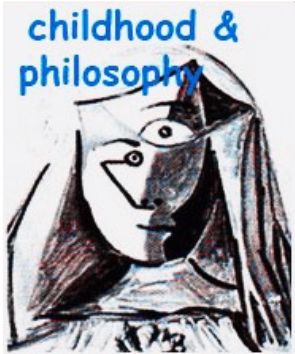how to generate (educate) an inquiring-jazzing community: free and open suggestions from an international workshop (ICPIC 2022)
DOI:
https://doi.org/10.12957/childphilo.2023.70680Palabras clave:
pedagojazz, jazzing, inquiring, P4wC, performanceResumen
This paper presents the collective reflection of a temporary community of inquiry (COI) created during an international workshop at the 20th biennial ICPIC conference--“Philosophy In And Beyond the Classroom: P4wc Across Cultural, Social, and Political Differences”-- and the suggestions emerging from that event. The workshop, entitled “Pedagojazz—improvising and inquiring, community interplay”, was conducted via Zoom, but participants were both online and present in person. The topic focused on the pedagojazz perspective, and the short activities proposed were aimed at involving the (temporary) COI in a collective discussion about how it would be possible to transform a community of inquiry into an inquiring-jazzing community. Three premises were introduced as common background on which to develop our reflections: the pedagojazz perspective; the connection between pedagojazz idioms and the different roles of the facilitator in P4wC; and the idea that jazz, and collective improvisation in particular, can inform COI development. The principles and practices of pedagojazz and collective improvisation are presented in detail here. During the workshop, Zoom chat and the Wooclap site were used to involve all participants and to gather their contributions and suggestions. A word cloud and three tables were produced and are presented here. Interesting themes, questions and perspectives emerged that can help us reflect in a more complex way on the education of P4wC facilitators across cultural, social and political differences.
Descargas
Citas
Attali, J. (1985). Noise: The political economy of music. University of Minnesota Press.
Barrett, F. (2012). Yes to the mess: Surprising leadership lessons from jazz. Harvard Business Review Press.
Bourdieu, P. (1992). Risposte. Per un’antropologia riflessiva. Bollati Boringhieri.
D’Olimpio, L., & Teschers, C. (2015). Playing with philosophy: Gestures, performance, P4C and an art of living. Conference for the Philosophy of Education Society of Australasia (PESA).
Demozzi, S., & Ilardo, M. (2020). Educational deontology in the community of philosophical inquiry. childhood & philosophy, 6, 1–16. doi: 10.12957/childphilo.2020.45955
Dewitt, Z., & Kingan, E. (2021). Forum theatre meets philosophy for/with children: Physically exploring challenging situations in the community of philosophical inquiry. childhood & philosophy, 17, 1–25. doi: 10.12957/childphilo.2021.53904
Echeverria, H. & Hannam, P. (2017). The community of philosophical inquiry (p4c) – a pedagogical proposal for advancing democracy. In M. R. Gregory, J. Haynes, & K. Murris (Eds.). The Routledge International Handbook of Philosophy for Children (pp. 3–10). Routledge.
Fischlin, D.; Heble, A. & Lipsitz, G. (2013). The fierce urgency of now: Improvisation, rights and the ethics of cocreation. Duke University Press.
Gould, S. J., & Vrba, E. S. (1982). Exaptation – a missing term in the science of form. Paleobiology, 8(1), 4–15.
Gregory, M. R., & Laverty, M. J. (2018). In community of inquiry with Ann Margaret Sharp. Childhood, philosophy and education. Routledge.
Gur-Ze’ev, I. (2010). Diasporic philosophy and counter-education. Sense.
Hamilton, A., & Konitz, L. (2007). Conversation on the improviser’s art. University of Michigan Press.
Kennedy, D. (2004). The role of a facilitator in a community of philosophical inquiry. Metaphilosophy, 35(5), 744–765.
Kennedy, D., & Kohan, W. (2021). some ethical implications of practicing philosophy with children and adults. childhood & philosophy, 17, 1–16. doi: 10.12957/childphilo.2021.61025
Kizel, A. (2016). Philosophy with children as an educational platform for self-determined learning. Cogent Education, 3(1), 1–11.
Kizel, A. (2021). the facilitator as self-liberator and enabler: ethical responsibility in communities of philosophical inquiry. childhood & philosophy, 17, 1–20. doi: 10.12957/childphilo.2021.53450
Kohan, W., Santi, M., & Wozniak, W. (2017). Philosophy for teachers: Between ignorance, invention, and improvisation. In M. R. Gregory, J. Haynes, & K. Murris (Eds.). The Routledge International Handbook of Philosophy for Children (pp. 253–259). Routledge.
Lipman, M. (1995). Moral education higher-order thinking and philosophy for children. Amsterdam: Early Child Development and Care, 107, 61–70.
Lipman, M. (2003). Thinking in education, 2nd ed. Cambridge University Press.
Preston-Roedder, E. (2020). What can philosophy learn from improvisational theatre? Precollege Philosophy and Public Practice, 2, 18–35.
Santi, M. (2016). Education as jazz: A framework to escape the monologue of teaching and learning. In M. Santi, E. Zorzi (Eds.) Education as jazz. Interdisciplinary sketches on a new metaphor (pp. 3–27). Cambridge Scholars.
Santi, M. (2017). Jazzing philosophy with children: An improvisational path for a new pedagogy. childhood & philosophy, 13(28), 631–647. doi: 10.12957/childphilo.2017.30038
Sawyer, K. (Ed.) (2011). Structure and improvisation in creative teaching. Cambridge University Press.
Scott, T. (2007). The pedagogical imperative of musical improvisation. Critical Studies in Improvisation, 3(2), 1–12.
Sharp, A. M. (1991). The community of inquiry: Education for democracy. Thinking in Education, The Journal of Philosophy for Children, 9(2), 31–37.
Small, C. (1987). Music of the common tongue. Wesleyan UP.
Taleb, N. (2012). Antifragile: Things that gain from disorder. Random House.
WHO (2001). International classification of functioning, disability and health http://apps.who.int/iris/bitstream/handle/10665/42407/9241545429.pdf;jsessionid=39B462609A921B87C2657909578FB3E1?sequence=1.
Woods, P. J. (2022). The collaborative pedagogies of solo improvisation: Learning through performance in noise music. Critical Studies in Improvisation, 15(11), 1–12.
Zorzi, E., & Santi, M. (2020). Improvising inquiry in the community: The teacher’s profile. childhood & philosophy, 16, 1–17. doi: 10.12957/childphilo.2020.46692
Descargas
Publicado
Cómo citar
Número
Sección
Licencia
el copyright de cada artículo pertenece a cada autor. childhood & philosophy tiene el derecho a la primera publicación. el permiso de reimprimir cualquier artículo que haya aparecido en la revista necesita de la autorización escrita del autor. en adisión a cualquier forma de reconocimiento requerido por el autor el siguiente aviso debe ser añadido a la declaración de permiso en la reimpresión (con los números apropiados a los puntos suspensivos): [título del artículo] fue publicado originalmente en la infancia y la filosofía, tomo ..., número ..., pp. ...-...




